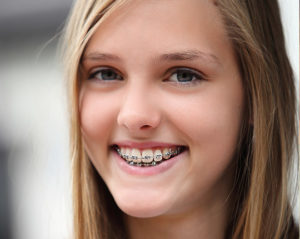Avoiding Delays During Your Orthodontic Treatment
October 3rd, 2018
 Many of our patients are excited to start orthodontic treatment, but they also look forward to getting them off to reveal their amazing new smiles. Your commitment to treatment protocols and caring for your braces can affect how long your treatment takes. While there is no way to predict exactly how quickly your teeth and bite will move into their correct position, there are ways that you can help the process move along smoothly and timely. Here are a few ways you can avoid progress delays during your orthodontic treatment.
Many of our patients are excited to start orthodontic treatment, but they also look forward to getting them off to reveal their amazing new smiles. Your commitment to treatment protocols and caring for your braces can affect how long your treatment takes. While there is no way to predict exactly how quickly your teeth and bite will move into their correct position, there are ways that you can help the process move along smoothly and timely. Here are a few ways you can avoid progress delays during your orthodontic treatment.
Keep Your Scheduled Visits
When days are filled with carpooling, work demands, and errands, you may be tempted to delay or cancel an appointment thinking that it will have little or no impact on treatment goals when in fact the opposite is true. Each of your visits while you are undergoing treatment is carefully planned to move your teeth a specific way in a certain time frame. Regular visits allow our team to make necessary adjustments to your braces and identify any problem areas that need correcting. Postponing or canceling these important visits can extend treatment time and significantly delay your progress — adding weeks or even months to the total treatment time.
Take Care of Your Braces
A surefire way to delay your orthodontic treatment is to continually damage your braces. An occasional break or bend of the brackets and wires is not uncommon, but if you encounter damage too frequently, it will interfere with the treatment timeline. You can prevent damage to your braces by always wearing a mouth guard when playing sports. You should also be mindful of the foods you eat to avoid breakage, especially those that are hard, sticky and chewy — such as popcorn, nuts, taffy, caramel, gum, corn on the cob and hard pretzels. It's also important to limit foods high in sugar.
Repair Damaged Braces As Soon As Possible
If your braces break or get damaged, contact our office right away. Ill-fitting brackets and wires aren’t capable of effectively correcting your teeth, which can cause major setbacks in the entire treatment process. Similarly, if you wear Invisalign® aligners and break or misplace them, notify our office immediately. It is critical that you replace your trays as soon as possible so that treatment can progress on schedule. Failure to notify our team of any issues can even create bigger, more permanent problems that require you to spend more time in braces.
Maintain Good Oral Hygiene Habits
It's always important to practice good oral hygiene, but this is especially true when you are straightening your teeth. When you are wearing braces, food and debris can easily become trapped around the brackets and wires. This puts you at a greater risk for infections and cavities, which can complicate and prolong your treatment. As a general rule, brush your teeth after eating meals and snacks to keep teeth and gums healthy throughout the duration of your orthodontic treatment. Seeing your regular dentist for exams and cleaning will also keep your teeth and gums in tip-top condition, enabling teeth to move more efficiently.
Follow Instructions From The Bel Air Orthodontics Team
Apart from routine adjustment visits, patient compliance will play an important part in treatment time and results. For example, many patients with braces will also need to wear elastics (aka rubber bands) at some point during their treatment. These rubber bands play a critical role in aligning your teeth and bite. Failure to follow instructions as directed is a guaranteed way to prevent your teeth from moving as scheduled.
Getting braces may seem like a long road, but we're here to tell you it is well worth it! Whether you choose traditional braces, Invisalign or other orthodontic procedures, the team at Bel Air Orthodontics is here to help you reach the best possible treatment outcome in the least amount of time and visits. By following these easy tips, you can stay on track with your orthodontic treatment and achieve the teeth and smile you’ve always wanted.
As always, your Bel Air Orthodontics team is here to help answer any questions you have along the way.



